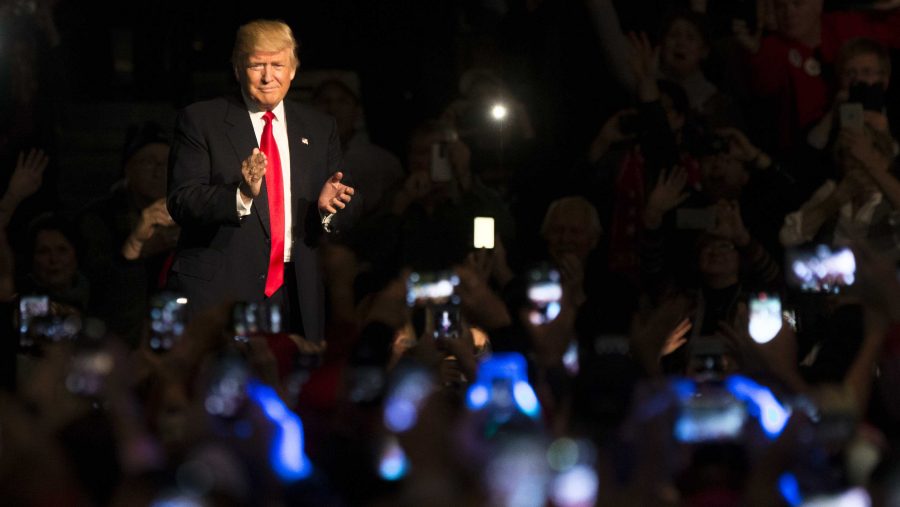Neal: Political jargon: Why it’s important to be critical
As the Iowa caucuses inch closer, social media platforms are increasingly flooded by polarized rhetoric targeting the masses. Readers need to be critical of this information on both sides to ensure fairness and accuracy.
FILE – Then-President-Elect Donald Trump thanks fans while making his entrance during an event for Trump and Vice President-Elect Mike Pence in Des Moines on Thursday, Dec. 8, 2016.
March 13, 2019
If you know me, you know I love social media — almost to a fault, but that’s another story.
Most of my feed consists of family, friends, a sprinkle of tweets from my favorite celebrities, and of course, lots and lots of opinions.
Look, opinions are great — I have to say that, look at the section I’m writing for (we’ll see if my editors like that joke or not).
But in all seriousness, I do value diversity of opinion (though my conservative Missourian relatives may beg to differ). Those opinions, however, should be accompanied with fact; and more specifically, accompanied with fact that was rightfully studied, dissected, and wholly solidified as fact.
We all have our First Amendment right to free speech, and sure, no one has a technical obligation to submit a lengthy, peer-reviewed essay every time she or he shares a politically charged Facebook post, although that might not be such a bad idea.
Still, it is important to be informed, and more importantly, to be critical of the information one takes in and the information one shares.
I commonly see far-left versus far-right rhetoric flooding my social-media feeds: posts that are so blatantly and blindly partisan that I don’t even want to give them the liberty of repetition.
Rhetoric that disguises itself as fact — systematically, and often unmaliciously, is often, in probably one of the ONLY times I will ever quote President Trump, “fake news.”
It happens on both sides.
It might seem harmless, and just maybe to an extent, it is. Pressing the “share” button on a scathing, partisan Facebook post that perfectly illustrates your political stance going into 2020 could seem like nothing.
But it’s not harmless. It’s polarizing and it’s divisive.
Not only that, but it more perfectly describes propaganda — the spreading of ideas with the purpose to cause harm to an institution or a person.
Let me be clear, this isn’t me attacking my political opposition. It’s me suggesting the criticism of not only the opposition but also the side, or sides, one aligns with.
RELATED: Laughing in the face of ‘Fake News’
One of the reasons I believe it is so important to be critical is because I know, at times, I haven’t been.
I know that at times, I find myself being critical of literally anyone but myself.
That’s not productive, and that does nothing but keep me in my own bubble. Look, the political posts are just beginning. It’s 2019, and in less than a year, we will be in a heap of caucus and primary jargon.
We will see polls, political smear ads, campaign slogans, commercials — the ever-so-anticipated Trump versus whoever snags the Democratic nomination debate coverage.
That’s a lot to take in, even now.
With all this information, and with all the media that information can be communicated through, how can we not be critical of, well, everything?
RELATED: Jaimes: Understanding the opinions section
How can we not see the dire need to sit back and ask, “Hey, is this garbage because it’s nonfactual or because I just don’t agree with it?”
The point is simple: Criticize everything — even this column. That interview you watched on Fox News, that primary coverage you overheard on CNN, that Facebook post your great-aunt shared attacking the “liberal agenda.”
Be informed, be enlightened, most importantly, don’t be fooled.






